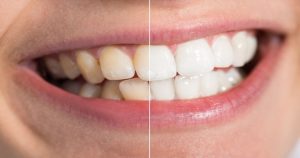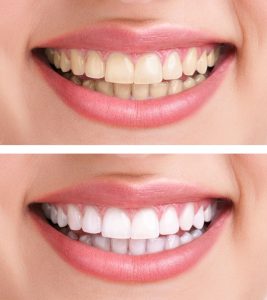Are you wondering if green tea stains your teeth?
Green tea is well-known for being a healthy alternative to a variety of other beverages, such as coffee and black tea. This article is for you if you drink green tea and are concerned about stains on your teeth.
No one wants stained teeth, and having a white smile is extremely desirable. As a result, green tea lovers may be concerned about whether or not green tea leaves stains. Unfortunately, the short answer is yes.
Green tea may stain teeth a gray color that can potentially become permanent without treatment. Green tea has a lower pH than black tea, resulting in less acidic contact, which is why it does not leave a yellow stain. But that’s not the whole story.
If you are a green tea enthusiast and you want to take advantage of green tea’s health advantages, there’s good news too: you don’t have to give up your daily cup of green tea to protect your white teeth. We’ll provide tips on how you can enjoy your favorite drink while maintaining a white smile.
In This Article
Does green tea stain your teeth?
Green tea does have the potential to discolor your teeth. Although the risk of tooth discoloration isn’t quite as high as it is with black tea, green tea is also known to stain teeth over time.

Why does green tea stain your teeth?
Green tea (along with other teas and beverages such as coffee) can discolor teeth and gums. There are two main components found in green tea that are primarily to blame for staining teeth: tannins and acids.
Depending on how frequently you drink green tea daily, the risk of staining your teeth increases. Drinking a cup of green tea once every two days or less is unlikely to discolor your teeth. But if you have heavy consumption, you may notice the green tea staining your teeth.
But there’s another side to it:
The acidity of the tea leads to a change in the pH balance in the mouth. This acidity level will erode your teeth enamel. When enamel is destroyed, colored particles may settle and adhere to your teeth more quickly. This process takes time and a lot of green tea, but that’s how green tea causes tooth discoloration.

Because green tea has lower acidic content, the stains appear dull gray and are less noticeable when compared to black tea’s yellow tooth stains. The pH scale of green tea ranges from 7 to 10. That’s why it causes a gray stain rather than a yellow stain and is less prone to causing tooth discoloration among infrequent green tea drinkers.
Tips on how to prevent tooth stains from green tea
There are a few things you can do to prevent your teeth from staining from drinking tea.
- Rinse your mouth. After a cup of green tea, rinse your mouth thoroughly. This will, to a considerable degree, rinse away most of the acidic substances that have gathered around your teeth.
- Brush your teeth. If it’s convenient, brush your teeth after a cup of green tea.
- Flossing. Many dentists recommend flossing daily. Daily flossing will not only assist in avoiding tooth darkening and discoloration caused by green tea, but it will also keep gums firm and healthy.
- Whitening toothpaste. Brush your teeth with teeth whitening toothpaste to maintain a whiter smile.
- Ultrasonic toothbrush. Use an electric or ultrasonic toothbrush. According to the conclusions of a new study, electric toothbrushes clean teeth and gums much better than manual toothbrushes.
- Use a straw. The purpose of using a straw to sip tea is to bring the tea to your mouth while not having contact with your teeth. This works well for preventing stains on your front upper and lower teeth, but it does nothing for your back teeth. It also works well for soda.
- Professional teeth whitening. If you consume a lot of green tea and have stains on your teeth, you might consider professional teeth whitening. Oral prophylaxis is a teeth-cleaning method that many individuals use to remove the green tea discoloration from their teeth. In most cases, this is done once every six months in a single session.
Conclusion
Yes, green tea can leave a grey stain on your teeth. However, it will not be as noticeable as the yellow stains caused by black tea, or the yellow stains caused by turmeric tea.
A professional teeth whitening performed by a dentist will be the quickest way to remove green tea teeth stains. The disadvantage of using professional treatments to avoid tooth staining from green tea is that you’ll have to see the dentist once every six months or so, which may become expensive. So, after a cup of green tea, follow the advice above.
You can read more about foods and drinks that stain teeth in our full guide here.
FAQs
Can green tea stain your teeth?
Yes. Even though it’s known as the healthier alternative, green tea can stain your teeth. The staining from green tea is more of a dull grey rather than the yellow stain from black tea.
Does green tea make your teeth yellow?
Because green tea has a higher pH than black tea and fewer acidic substances, it does not leave a yellow stain like black tea. However, green tea can cause dull gray discoloration.
Can I drink green tea after teeth whitening?
Drinking green tea after teeth whitening will not be as harmful as drinking coffee or black tea. The lighter the color of a beverage, the less likely it is to discolor your teeth.
Does matcha stain teeth?
Matcha, like any other green tea, contains tannins, which can stain your white teeth over time. However, matcha green tea is also known for having a lot of benefits for your oral health.
letsdrinktea.com: Does Green Tea Stain Your Teeth? Consulted 7th January 2022
teahow.com: Does Green Tea Stain Your Teeth? Consulted 7th January 2022




